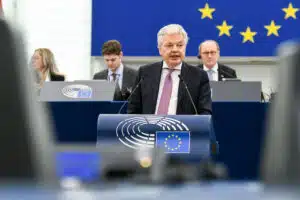Brussels – European Commissioner Didier Reynders is following in the footsteps of Margrethe Vestager and Jutta Urpilainen, hoping not that the vote will not have the same oucome. As the European Commission said in a press release, the Justice Commissioner in the cabinet headed by Ursula von der Leyen informed the president of the EU executive that the Committee of Ministers of the Council of Europe recommended him to the Parliamentary Assembly for the post of Secretary-General of the Strasbourg-based human rights organization. In the run-up to the election campaign, he was granted unpaid leave starting April 25.

As the Commission specifies in the same statement, until April 25 Reynders will refrain from participating “directly and indirectly in any activity related to the election campaign”and will ensure that “no such activity is conducted in his name.” The Code of Conduct for Members of the College of Commissioners will continue to apply. In particular, the President stressed the obligation not to use human or material resources of the Commission. Reynders may take “any additional measures that may be necessary to avoid any perception of conflict of interest.” In this context, it should be noted that Reynders’ communication is addressed to a Commission chairwoman who at this time is also Spitzenkandidatin of the European Popular Party in the June 6-9 European elections and who (like Labor and Social Rights Commissioner Nicolas Schmit the Spitzenkandidat of the European Socialist Party), has not stepped down from her institutional position during the campaign.
Given the expiring term of Croatia’s Marija Pejčinović Burić, in early January the Belgian liberal politician announced his readiness to run for the second consecutive time for the leadership of the international organization in Strasbourg (which is not among the EU institutions). On January 10, the Belgian government confirmed its choice of the current EU justice commissioner as the candidate in the June 24-28 elections, despite the defeat he suffered in 2019 -when he was the Belgian deputy prime minister and minister of foreign affairs and defense – at the very hands of the current Croatian secretary-general. This time, he will be up against former Swiss President Alain Berset and former Estonian Culture Minister Indrek Saar. At the Parliamentary Assembly of the Council of Europe in late June, he will need the support of the majority of the Council of Europe’s 46 member states. In the scenario in which Reynders finally succeeds in being elected as secretary-general, it is not yet known whether he will hold his post at the Commission until the new European Commission takes office, or whether he will leave the post before he takes office at the end of September, following the example of several of his colleagues.
In addition to Reynders, all the farewells from the Commission
Commissioner Reynders is the latest name in a long list of farewells – temporary and otherwise – although, in the worst-case scenario, it would be at the last moment. There are nine commissioners who — be it for non-approval or leaving for electoral or personal reasons — have changed (or risk changing) the shape of the College President von der Leyen in 2019, at the start of the five-year term. One-third of the entire initial team will see its size possibly drop to 26 with Reynders’ temporary leave.

Members of the von del Leyen Commission designated on September 10, 2019
The first defections came as a result of ‘levity’ from von der Leyen immediately with the presentation of her team of commissioners. The Legal Affairs Committee (Juri) of the European Parliament in late September 2019 decided to reject the names agreed between the President of the EU executive and the governments of Romania and Hungary: the Romanian Rovana Plumb (S&D) and the Hungarian László Trócsányi (Ppe) had been deemed “not capable of exercising their functions in accordance with the Treaties and the Code of Conduct.” Two weeks later, French Sylvie Goulard failed to pass due to political reprisals by MEPs against Paris. A year later, during the Covid-19 health crisis, the Irish Trade Commissioner Phil Hogan was found not complying with the confinement rules, and the Dublin government pushed him to resign: his post was taken over by Vice President Valdis Dombrovskis, while Irish Mairead McGuinness took over as portfolio head for Financial Services.
All other defections came in 2023. First was the Bulgarian Commissioner for Innovation, Research, Culture, Education and Youth, Mariya Gabriel, in mid-May to aim for the post (that materialized) of deputy prime minister and foreign minister in Bulgaria. Her step back triggered a redistribution of posts at the Commission: Executive Vice-President Vestager had been given that of Innovation and Research, while the Vice-President for European Lifestyle, Margaritis Schinas, had been given that of Education, Culture and Youth. It all became even more complicated with the temporary leave requested and obtained from Vice-President Vestager herself to run as Denmark’s candidate for the presidency of the European Investment Bank (EIB): the whole package of the former Commissioner Gabriel passed to Vice-President Schinas, until the Bulgarian replacement, Iliana Ivanova, took office. Vestager’s files were distributed between the Commissioner for Justice, Didier Reynders (Competition), and the Commissioner for Values and Transparency, Věra Jourová (Digital Policy), until Vestager’s return on December 12.

European Commission President Ursula von der Leyen on the day of the presentation of the College of Commissioners (September 10, 2019)
In August, the executive vice president responsible for the European Green Deal, Frans Timmermans, officially resigned after being chosen in the Netherlands to lead the coalition formed by the center-left Labor Party and the Green Left GroenLinks ahead of the November 22 parliamentary elections. Von der Leyen has divided Timmermans delegations into two: the post of head of the European Green Deal has been given to the vice-president for Inter-institutional Relations, Maroš Šefčovič, who has also been appointed ad interim Commissioner for Climate, until the nomination of the new Dutch commissioner, Wopke Hoekstra. Finally, on November 19, the Commissioner for International Partnerships, Jutta Urpilainen, gave her willingness to stand in the presidential elections in Finland as a Social Democratic candidate: from December 2 until January 28, Urpilainen remained on unpaid leave – and her portfolio passed momentarily to Vice-President Schinas – until her return to the College of Commissioners following the defeat at the Finnish polls.
English version by the Translation Service of Withub






